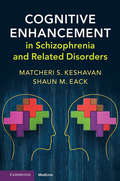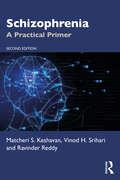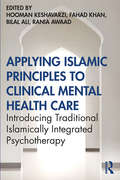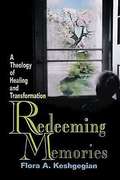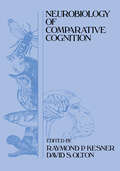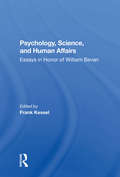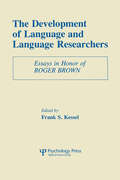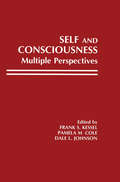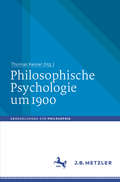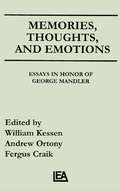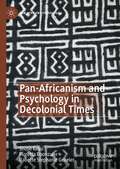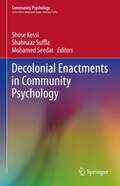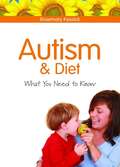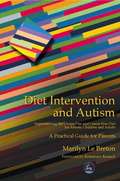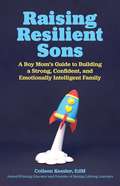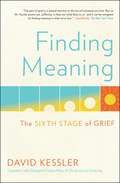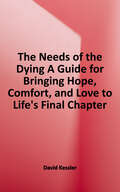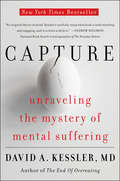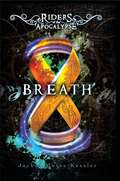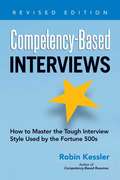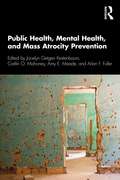- Table View
- List View
Cognitive Enhancement in Schizophrenia and Related Disorders
by Matcheri Keshavan Shaun EackSchizophrenia and related psychiatric disorders can be highly disabling. Deficits in cognition, involving skills such as attention, problem solving and social understanding are core symptoms of many psychiatric disorders, which greatly impact the quality of life of patients. New research demonstrates the evidence for cognitive enhancement therapies, capable of relieving these deficits. This book explores the evidence for cognitive enhancement therapies and their mode of action, making recommendations for individualized implementation strategies. The topics covered include computer-based exercises, psychotherapeutic group activities, and pharmacological interventions. This book is designed to serve the needs of practicing clinicians, researchers, and mental health students. It is packed full of illustrations and case vignettes from the author's own practice and includes an up-to-date bibliography of the major works in this field.
Schizophrenia: A Practical Primer
by Matcheri S. Keshavan Vinod H Srihari Ravinder ReddyThis second edition of Schizophrenia: A Practical Primer, includes decades of clinical and research experience in the field and helps readers understand what schizophrenia is and how it is managed. Schizophrenia is a devastating illness that affects more than 50 million people worldwide. Written to help anyone who is faced with managing schizophrenia, whether as a clinician, patient, friend, or family member, this accessible book is an ideal first stop for practical, up-to-date information. It includes an overview of schizophrenia and provides answers to common questions that arise on different aspects of the illness, such as: diagnosis, pharmacological and psychotherapeutic management, treatment challenges and achieving recovery. Beyond these key issues, the book includes developments in the neurobiology of the illness, foreseeable developments and the history of schizophrenia. It also includes brief, realistic case vignettes adapted from clinical experience, and questions interspersed throughout the book to aid understanding. This book is essential for professional trainee and early-career mental-health workers, such as psychiatrists, psychologists, social workers, counselors and nurses, and is written to cover in a concise and accessible way what is of immediate and practical relevance to gain familiarity with schizophrenia.
Schizophrenia: A Practical Primer
by Matcheri S. Keshavan Vinod Srihari Ravinder ReddyThis second edition of Schizophrenia: A Practical Primer, includes decades of clinical and research experience in the field and helps readers understand what schizophrenia is and how it is managed.Schizophrenia is a devastating illness that affects more than 50 million people worldwide. Written to help anyone who is faced with managing schizophrenia, whether as a clinician, patient, friend, or family member, this accessible book is an ideal first stop for practical, up-to-date information. It includes an overview of schizophrenia and provides answers to common questions that arise on different aspects of the illness, such as: diagnosis, pharmacological and psychotherapeutic management, treatment challenges and achieving recovery. Beyond these key issues, the book includes developments in the neurobiology of the illness, foreseeable developments and the history of schizophrenia. It also includes brief, realistic case vignettes adapted from clinical experience, and questions interspersed throughout the book to aid understanding.This book is essential for professional trainee and early-career mental-health workers, such as psychiatrists, psychologists, social workers, counselors and nurses, and is written to cover in a concise and accessible way what is of immediate and practical relevance to gain familiarity with schizophrenia.
Applying Islamic Principles to Clinical Mental Health Care: Introducing Traditional Islamically Integrated Psychotherapy
by Hooman KeshavarziThis text outlines for the first time a structured articulation of an emerging Islamic orientation to psychotherapy, a framework presented and known as Traditional Islamically Integrated Psychotherapy (TIIP). TIIP is an integrative model of mental health care that is grounded in the core principles of Islam while drawing upon empirical truths in psychology. The book introduces the basic foundations of TIIP, then delves into the writings of early Islamic scholars to provide a richer understanding of the Islamic intellectual heritage as it pertains to human psychology and mental health. Beyond theory, the book provides readers with practical interventional skills illustrated with case studies as well as techniques drawn inherently from the Islamic tradition. A methodology of case formulation is provided that allows for effective treatment planning and translation into therapeutic application. Throughout its chapters, the book situates TIIP within an Islamic epistemological and ontological framework, providing a discussion of the nature and composition of the human psyche, its drives, health, pathology, mechanisms of psychological change, and principles of healing. Mental health practitioners who treat Muslim patients, Muslim clinicians, students of the behavioral sciences and related disciplines, and anyone with an interest in spiritually oriented psychotherapies will greatly benefit from this illustrative and practical text.
Redeeming Memories: A Theology of Healing and Transformation
by Flora A. KeshgegianThough the church has often been complicit in regimes of domination that have perpetrated abuse, persecution, and violence, Keshgegian reminds us that the witness of the church is to remember for transformation. Such remembrance is shaped by the narrative of Jesus' life and ministry, death and resurrection--knit together in the promise of incarnation. The church as a community of remembrance honors and preserves memories of suffering, evokes and validates memories of resistance, and actively supports, embodies, and celebrates memories of connection and life affirmation. In particular, Keshgegian draws our attention to those who have suffered childhood sexual abuse, victims of the Armenian genocide and the Jewish Holocaust, and other historically disinherited peoples and groups. With such powerful memories of suffering in mind, she insists that redeeming memories is the purpose and mission of the church. Keshgegian challenges us to understand that the redemptive potential of the memory of Jesus Christ will be made known and realized by the capacity of that memory to hold and carry not only the story of Jesus, but of all those who suffer, struggle, live, and die. "In Redeeming Memories Keshgegian contributes a unique and well-developed amendment to the growing literature on theologies of memory. Too often, she notes, experiences of suffering and abuse are treated as though they are absolute. Yet these experiences characteristically encompass ambiguity and doubt. In order to 'face the past in new ways,' survivors must first enter back into their experiences, 'undigested and disconnected,' without certainty. Transformation occurs when it is not only the suffering that is remembered, but when 'instances of resistance and agency' are incorporated into the 'testimony and witness. ' Keshgegian develops her understanding of how remembering is redemptive in two sections. The first considers contemporary movements of communities that have suffered childhood sexual abuse, the Armenian genocide and the Jewish holocaust, and historical marginalization. Keshgegian herself is Armenian, drawing from a wealth of examples from her family's stories in explaining her understanding of the dynamics of remembering. In part two, she turns to a theological reconstruction of memory, where we are called to understand witness as 'withness' that moves beyond solidarity with victims to 'active participation in redemption. ' We are charged also to tell the story of Jesus Christ in complex ways that honor the fullness of life as well as the cross. Finally, we are invited to understand worship as a time when 'we remember God and God remembers us'--the church as a place where remembering past suffering walks hand-in-hand with responding to present need. Keshgegian's book is beautifully written and well argued, compelling us to enter into the ambiguous, redemptive work of memory it so well describes. "--Cynthia Rigby, Austin Presbyterian Theological Seminary, in Religious Studies Review, Volume 29 Number 3, July 2003.
Dreams and visions in the early middle ages: the reception and use of patristic ideas, 400-900
by Jesse KeskiahoDreams and visions played important roles in the Christian cultures of the early middle ages. But not only did tradition and authoritative texts teach that some dreams were divine: some also pointed out that this was not always the case. Exploring a broad range of narrative sources and manuscripts, Jesse Keskiaho investigates how the teachings of Augustine of Hippo and Pope Gregory the Great on dreams and visions were read and used in different contexts. Keskiaho argues that the early medieval processes of reception in a sense created patristic opinion about dreams and visions, resulting in a set of authoritative ideas that could be used both to defend and to question reports of individual visionary experiences. This book is a major contribution to discussions about the intellectual place of dreams and visions in the early middle ages, and underlines the creative nature of early medieval engagement with authoritative texts.
Neurobiology of Comparative Cognition (Comparative Cognition and Neuroscience Series)
by Raymond P. Kesner David S. OltonThis book represents a unique and elaborate exposition of the neural organization of language, memory, and spatial perception in a wide variety of species including humans, bees, fish, rodents, and monkeys. The editors have united the comparative approach with its emphasis on evolutionary determinants of behavior, the neurobiological approach with its emphasis on the neural determinants of behavior, and the cognitive approach with its emphasis on understanding higher-order mental functions. The combination of these three approaches provides an unusual look at the neurobiology of comparative cognition, and should stimulate increased investigations in this field and related disciplines.
Psychology, Science, And Human Affairs: Essays In Honor Of William Bevan
by Frank Kessel Norman Garmezy Richard Trumbull Michael SokalThese original essays, written by prominent scholars, pay tribute to the work of William Bevan. In the course of his distinguished career, Bevan has exhibited an almost unique capacity to focus a clear-eyed, critical gaze on operating assumptions and actions—his own and those of others—and to initiate consequential, constructive steps forward, both
The Development of Language and Language Researchers: Essays in Honor of Roger Brown
by Frank S. KesselFirst published in 1988. This is a collection of essays that were presented at or generated afterwards at a meeting on language acquisition Society Development in April 1981: a symposium on “The Development of Language and Language Researchers: Whatever Happened to Linguistic Theory?” in Boston.
Self and Consciousness: Multiple Perspectives
by Frank S. Kessel Pamela M. Cole Dale L. JohnsonThis volume contains an array of essays that reflect, and reflect upon, the recent revival of scholarly interest in the self and consciousness. Various relevant issues are addressed in conceptually challenging ways, such as how consciousness and different forms of self-relevant experience develop in infancy and childhood and are related to the acquisition of skill; the role of the self in social development; the phenomenology of being conscious and its metapsychological implications; and the cultural foundations of conceptualizations of consciousness. Written by notable scholars in several areas of psychology, philosophy, cognitive neuroscience, and anthropology, the essays are of interest to readers from a variety of disciplines concerned with central, substantive questions in contemporary social science, and the humanities.
Philosophische Psychologie um 1900 (Abhandlungen zur Philosophie)
by Thomas KesselDieser Band stellt die eigentümlichen Mischungsverhältnisse natur- und geisteswissenschaftlicher Perspektiven im Feld der philosophischen Psychologien um 1900 ins Zentrum. Diese Konzeptionen, die den engen Rahmen des Psychologismus-Streites überschreiten und ihn gleichwohl kontextualisieren, werden durch Beiträge zu Franz Brentano, Wilhelm Dilthey, Carl Stumpf, Theodor Lipps, Wilhelm Wundt, Oswald Külpe, Edmund Husserl, Wilhelm Windelband, Paul Natorp und Nicolai Hartmann repräsentiert.
Memories, Thoughts, and Emotions: Essays in Honor of George Mandler
by William Kessen Andrew Ortony Fergus CraikFor the past forty years, the ideas and findings of George Mandler -- and George Mandler himself -- have been highly influential throughout the field of experimental psychology. Not only has he helped to advance the study of cognition and emotion in many ways, but he also offered assistance and encouragement to numerous young researchers who may expand on the knowledge acquired thus far. The editors of this festschrift feel that one of the greatest strengths of Mandler's work is the blend of European theorizing and American empiricism. This volume contains contributions from friends and colleagues who have been influenced in one way or another by this accomplished psychologist.
Pan-Africanism and Psychology in Decolonial Times (Pan-African Psychologies)
by Shose Kessi Floretta Boonzaier Babette Stephanie GekelerThis book explores the potential of Pan-African thought in contributing to advancing psychological research, theory and practice. Euro/American mainstream psychology has historically served the interests of a dominant western paradigm. Contemporary trends in psychological work have emerged as a direct result of the impact of violent histories of slavery, genocide and colonisation. Hence, this book proposes that psychology, particularly in its social forms, as a discipline centered on the relationship between mind and society, is well-placed to produce the critical knowledge and tools for imagining and promoting a just and equitable world.
Decolonial Enactments in Community Psychology (Community Psychology)
by Shose Kessi Shahnaaz Suffla Mohamed SeedatThis edited volume in the Community Psychology Book Series emphasizes applications of community psychology for disrupting dominant and hegemonic power relations. The book explores domains of work that are located within critical community psychology, as well as work that is conventionally not self-defined as community psychology but which draws on and contributes to the foundations and enactments of critical and liberatory community psychology. Specifically, the book advances conceptions and praxes for community psychology grounded within a decolonial framework. The volume heeds the call for a generation of approaches to community psychology that link local struggles to broader questions of power, identity, and knowledge production, bringing together examples of praxes from different contexts as a political project of highlighting indigenous struggles toward self-determination. Collectively, the chapters in this book embody a decolonial agenda for community psychology that foregrounds social justice; the lives and knowledges of the marginalized and oppressed; epistemic disobedience and transdisciplinarity; and decolonial aesthetics. The book is divided into two parts - Part I: Conceptions of Engagement for Community Psychology delves into the conceptual framework for a decolonial community psychology, and Part II: Modes of Enactments and Praxes for Community Psychology builds on these theoretical advancements through examples of praxis in different contexts. The audience for the book includes scholars, researchers, practitioners, activists, and students located within community psychology specifically, as well as disciplines within the health and social sciences, and arts and humanities more broadly.
Autism and Diet: What You Need to Know
by Rosemary KessickParents have been reporting a connection between autism and diet for decades, but for many years the science behind the connection was evasive. Today, we see a growing body of research to back up parental-reported evidence that certain foods and other environmental sources can affect the developing brains of some children, and trigger adverse behavioural episodes. Written by an autism expert who has witnessed in her own child the dramatic improvement that can be made through dietary intervention, this book offers an 'easily digestible' guide to the science behind the considerations; strategies for implementing a safe diet; a handy list of ingredients to be avoided; as well as a concise bank of essential resources and useful contacts. This book offers an accessibly concise guide to all aspects of dietary invention in children with autism, and is an ideal resource for parents, teachers and any other family member or caregiver who needs to know how to help implement a safe and healthy diet for an autistic child.
Diet Intervention and Autism: Implementing the Gluten Free and Casein Free Diet for Autistic Children and Adults - A Practical Guide for Parents
by Rosemary Kessick Marilyn Le BretonPeople with autism often are intolerant of gluten (a protein in four types of cereal) and casein (a protein found in animal milk). There are many testaments to the benefits for such people of a diet that excludes gluten, casein, monosodium glutamate and aspartame, and these persuaded Marilyn Le Breton to put her autistic son Jack on the diet. This is the book that Marilyn wishes had been available to her when she first did so. In it she explains what the diet is all about and how it works, what foods can form part of the diet and what should be excluded. She addresses frequently asked questions and misconceptions, such as 'Is the diet too difficult and time-consuming? How strictly do I need to adhere to it? Is the diet expensive to implement?' and gives practical advice on basic equipment and ingredients, what to expect when your child starts the diet, how to adapt family meals and how to minimise cross-contamination in the kitchen. The book includes a wide selection of recipes, an extensive list of addresses and websites of suppliers of foodstuffs in the UK, and suggestions for finding out more information. It is the first book of its kind to be written specifically for those living in the UK. Marilyn's own experience and sensible approach ensure that this book will be invaluable for any parent of a child with autism, or any adult considering embarking on the diet.
Raising Resilient Sons: A Boy Mom's Guide to Building a Strong, Confident, and Emotionally Intelligent Family
by Colleen KesslerYou're a caring mother of boys, part of the "boy mom" phenomenon—now learn how to raise your son to be compassionate, empathetic, and emotionally intelligent with this parenting guide made just for you. Raising a boy, also known as being a &“boy mom,&” is tough in today&’s culture. We want our sons to grow into strong men who will stand up for what&’s right and take care of those they love, but we also want them to share their thoughts, show their feelings, and express emotions in appropriate ways. At its core, we need to teach our boys empathy. That&’s where emotional intelligence comes in. Boys need to understand what they&’re feeling in any given situation and be able to regulate themselves accordingly. In this first-ever book combining emotional intelligence with parenting specific to boys, boy moms will learn how to help their sons: - identify and name their emotions - develop empathetic listening skills - nurture positive and lasting relationships with others - tackle life with a growth mindset - use strategies like mindfulness to regulate their emotions With Raising Resilient Sons, parents will be equipped with the tools they need to build up their sons into the men they know they can be—men who look for the good, spread kindness, react with empathy, and lead with strength and resilience.
Finding Meaning: The Sixth Stage of Grief
by David KesslerIn this groundbreaking new work, David Kessler—an expert on grief and the coauthor with Elisabeth Kübler-Ross of the iconic On Grief and Grieving—journeys beyond the classic five stages to discover a sixth stage: meaning.In 1969, Elisabeth Kübler Ross first identified the stages of dying in her transformative book On Death and Dying. Decades later, she and David Kessler wrote the classic On Grief and Grieving, introducing the stages of grief with the same transformative pragmatism and compassion. Now, based on hard-earned personal experiences, as well as knowledge and wisdom earned through decades of work with the grieving, Kessler introduces a critical sixth stage. Many people look for &“closure&” after a loss. Kessler argues that it&’s finding meaning beyond the stages of grief most of us are familiar with—denial, anger, bargaining, depression, and acceptance—that can transform grief into a more peaceful and hopeful experience. In this book, Kessler gives readers a roadmap to remembering those who have died with more love than pain; he shows us how to move forward in a way that honors our loved ones. Kessler&’s insight is both professional and intensely personal. His journey with grief began when, as a child, he witnessed a mass shooting at the same time his mother was dying. For most of his life, Kessler taught physicians, nurses, counselors, police, and first responders about end of life, trauma, and grief, as well as leading talks and retreats for those experiencing grief. Despite his knowledge, his life was upended by the sudden death of his twenty-one-year-old son. How does the grief expert handle such a tragic loss? He knew he had to find a way through this unexpected, devastating loss, a way that would honor his son. That, ultimately, was the sixth state of grief—meaning. In Finding Meaning, Kessler shares the insights, collective wisdom, and powerful tools that will help those experiencing loss. Finding Meaning is a necessary addition to grief literature and a vital guide to healing from tremendous loss. This is an inspiring, deeply intelligent must-read for anyone looking to journey away from suffering, through loss, and towards meaning.
The Needs of the Dying: A Guide for Bringing Hope, Comfort, and Love to Life's Final Chapter
by David Kessler"This book serves the needs of the person sitting by the bedside as much as it does the person who is lying in the bed. In it you will find gentleness and peace in the experience of death." -- Marianne Williamson <p><p>In gentle, compassionate language, The Needs of the Dying helps us through the last chapter of our lives. Author David Kessler has identified key areas of concern: the need to be treated as a living human being, the need for hope, the need to express emotions, the need to participate in care, the need for honesty, the need for spirituality, and the need to be free of physical pain. Examining the physical and emotional experiences of life-challenging illnesses, Kessler provides a vocabulary for family members and for the dying that allows them to communicate with doctors, with hospital staff, and with one another, and—at a time when the right words are exceedingly difficult to find—he helps readers find a way to say good-bye. Using comforting and touching stories, he provides information to help us meet the needs of a loved one at this important time in our lives.
Capture: Unraveling the Mystery of Mental Suffering
by David A. KesslerWhy do we think, feel, and act in ways we wished we did not? For decades, New York Times bestselling author Dr. David A Kessler has studied this question with regard to tobacco, food, and drugs. Over the course of these investigations, he identified one underlying mechanism common to a broad range of human suffering. This phenomenon--capture--is the process by which our attention is hijacked and our brains commandeered by forces outside our control.In Capture, Dr. Kessler considers some of the most profound questions we face as human beings: What are the origins of mental afflictions, from everyday unhappiness to addiction and depression--and how are they connected? Where does healing and transcendence fit into this realm of emotional experience?Analyzing an array of insights from psychology, medicine, neuroscience, literature, philosophy, and theology, Dr. Kessler deconstructs centuries of thinking, examining the central role of capture in mental illness and questioning traditional labels that have obscured our understanding of it. With a new basis for understanding the phenomenon of capture, he explores the concept through the emotionally resonant stories of both well-known and un-known people caught in its throes.The closer we can come to fully comprehending the nature of capture, Dr. Kessler argues, the better the chance to alleviate its deleterious effects and successfully change our thoughts and behavior Ultimately, Capture offers insight into how we form thoughts and emotions, manage trauma, and heal. For the first time, we can begin to understand the underpinnings of not only mental illness, but also our everyday worries and anxieties. Capture is an intimate and critical exploration of the most enduring human mystery of all: the mind.
Breath
by Jackie Morse KesslerContrary to popular belief, the Four Horsemen of the Apocalypse aren't just harbingers of doom--they actually keep life in balance. But what happens when their leader and creator, Death, becomes suicidal? Before the first living thing drew its first gasping breath, he was there. He has watched humanity for millennia. And he has finally decided that humanity is not worth the price he has paid time and again. When Death himself gives up on life, a teenager named Xander Atwood is the world's only hope. But Xander bears a secret, one that may bring about the end of everything. This heart-pounding final installment of the Riders of the Apocalypse series looks at the value of life, the strength of love, and how a small voice can change everything . . . forever.
Workout mit Baby: Was gut tut und fit hält
by Josef Kessler Constanze Bast-Kessler Jana KriegerFit nach der Geburt und ein zufriedenes Baby - das wünschen sich Mütter, Väter und Großeltern. Keine Zeit für das Fitnessstudio, keine Geräte zuhause? Das Kind will geknuddelt, bewegt oder beruhigt werden? Lassen Sie sich ein auf Übungen, mit denen Sie selbst mobil und stark bleiben und die Sie zusammen mit dem Baby ganz einfach durchführen können.Das Buch bietet mithilfe von Illustrationen Anleitungen für kurze Trainingseinheiten, die Sie spielerisch in den Alltag einstreuen können. Inklusive Aufwärmübungen, Muskeltraining und Dehnungen. Nebenbei erklären der Neuropsychologe und die Psychologin, wie sich das Kind nach der Geburt geistig und körperlich entwickelt und wie Sie fit bleiben, gemeinsam mit dem Baby viel Spaß haben und gleichzeitig dessen Motorik und Sinne ansprechen.
Der andere Anti-Demenz-Ratgeber: Wie Sie mit falscher Ernährung, wenig Bewegung und Einsamkeit Ihren Verstand schädigen
by Josef Kessler Pia Linden Ann-Kristin FolkertsDer etwas andere Ratgeber zur Vorbeugung von Demenzerkrankungen packt uns bei unseren Schwächen und provoziert: Wir erfahren, was wir tun können, um unseren Weg zu einer Demenz zu beschleunigen. Wir können sogar wählen, ob wir den neurodegenerativen oder den vaskulären Weg bevorzugen. Für alle, die es satt haben, auf ihren kognitiven Verfall im Alter nur passiv zu warten: Wie wir mit Eigeninitiative und Selbstständigkeit den zügigen Abbau unseres Gedächtnisses fördern. Die Autoren geben Tipps und Anregungen aus den Bereichen Altern, Ernährung, Bewegung, Bildung, Sozialkontakte, Sinnesorgane, Alkohol, Drogen und Lifestyle.
Competency-Based Interviews: How to Master the Tough Interview Style Used by the Fortune 500s (Competency-based Ser.)
by Robin KesslerPeople interviewing for jobs today often fail because they are using yesterday's strategies. Technology is becoming more sophisticated and virtual assessment centers are being used to assess how strong candidates are in key competency areas. Global competencies are being used to help organizations choose people for international assignments or simply to work on diverse international teams. The best employers are constantly changing the way interviews are done. This newly revised edition of Competency-Based Interviews offers you a new and more effective way to handle the tough new interviews so that you will emphasize the knowledge, skills, and abilities that you have and that employers demand. <P><P> Preparing for a competency-based interview will give you the strategy you need to: <li>Be selected for the most competitive positions <li>Win the best job at a new organization <li>Get a great first job or internship <li>Be chosen for that critical promotion in your current organization <li>Take control of your career path <li>Increase your salary <li>Secure more interesting assignments and more interesting work
Public Health, Mental Health, and Mass Atrocity Prevention
by Jocelyn Getgen Kestenbaum Caitlin Mahoney Amy Meade Arlan FullerThis multidisciplinary volume considers the role of both public health and mental health policies and practices in the prevention of mass atrocity, including war crimes, crimes against humanity, and genocide. The authors address atrocity prevention through the framework of primary (pre-conflict), secondary (mid-conflict), and tertiary (post-conflict) settings. They examine the ways in which public health and mental health scholars and practitioners currently orient their research and interventions and the ways in which we can adapt frameworks, methods, tools, and practice toward a more sophisticated and truly interdisciplinary understanding and application of atrocity prevention. The book brings together diverse fields of study by global north and global south authors in diverse contexts. It culminates in a narrative that demonstrates the state of the current fields on intersecting themes within public health, mental health, and mass atrocity prevention and the future potential directions in which these intersections could go. Such discussions will serve to influence both policy makers and practitioners in these fields toward developing, adapting, and testing frames and tools for atrocity prevention. Multidisciplinary perspectives are represented among editors and authors, including law, political science, international studies, public health, mental health, philosophy, clinical psychology, social psychology, history, and peace studies.
